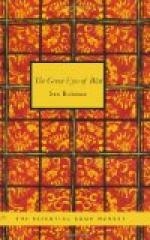“Good heavens!” I said. “The young fool seems determined to put a rope around his own neck.”
“As a matter of fact,” continued Gatton, “he was not unobserved. He was followed right across St. James’s Park. By the lake he lingered for some time; and the man tracking him kept carefully out of sight, of course. There was nobody else about at the moment, and presently, thinking himself safe, Coverly dropped his bag in the water! Immediately he set off walking rapidly again, and he was followed right to Miss Merlin’s door. But the spot where he had dropped the bag had been marked, of course, and when I came in here to-day it had been fished, up—and placed there for my inspection.”
With ever-growing misgivings:
“What does it contain?” I asked.
Inspector Gatton walked across to the chair and threw the bag open. First he took out several lumps of wet coal.
“To weight it, of course,” he said.
Then one by one he withdrew from the clammy interior a series of ragged garments, the garments of a tramp. A pair of heavy boots there were, a pair of patched trousers and an old shabby coat, a greasy cap, and finally a threadbare red muffler!
Gatton looked hard at me.
“He will have to break his obstinate silence now,” he said. “Failing our discovery of new clews pointing in another direction, this is hanging evidence!”
“It is maddening!” I cried. “Can nothing be done, Gatton? Is there no possible line of inquiry hitherto neglected which might lead to the discovery of the truth? For whatever your own ideas may be, personally I am certain that Coverly is innocent.”
Gatton replaced the sodden garments one by one in the bag, frowning as he did so, and:
“It occurred to me this morning,” he replied, “that there is one inquiry which in justice to the suspected man and in order to round off the investigation, should be instituted. I’m afraid Coverly will have a bad time in the Coroner’s court, but it is even possible that something might be done before the inquest. Now—”
He looked at me quizzically, and:
“Knowing your keen personal interest in the case, I am going to make a suggestion. It is probably going outside the intentions of the chief in regard to your share of the inquiry, but I’ll risk that. I stipulate, however, that anything you learn is to be communicated direct to me, not to the Planet. Is this arrangement consistent with your journalistic conscience?”
“Quite,” I said eagerly; “my contributions to the Planet are always subject, of course, to your censorship. What is it that you propose I should do?”
“This,” said Gatton tersely; “I should like to know under what circumstances Mr. Roger Coverly died.”
“Roger Coverly?” I echoed.
“The son of Sir Burnham Coverly,” continued Gatton, “and therefore the direct heir to the title. He died somewhere abroad about five or six years ago, and as a result the late Sir Marcus inherited the baronetcy on the death of his uncle, Sir Burnham. You will remember that the man, Morris, spoke of the ill-feeling existing between Lady Burnham Coverly and Sir Marcus, because of the premature death of her own son, of course.”




